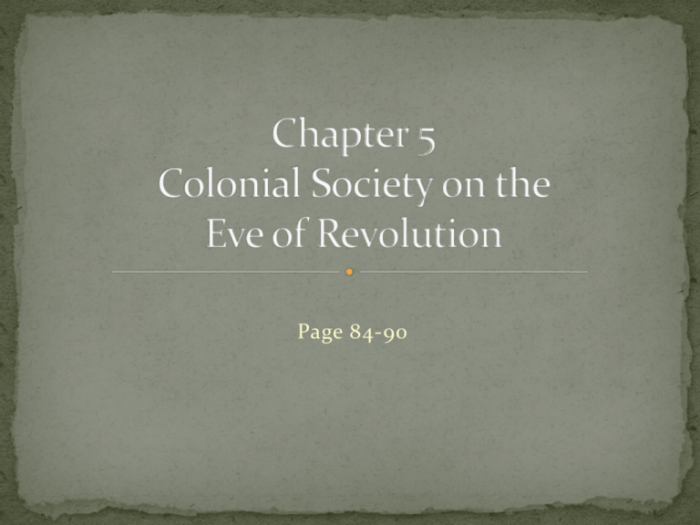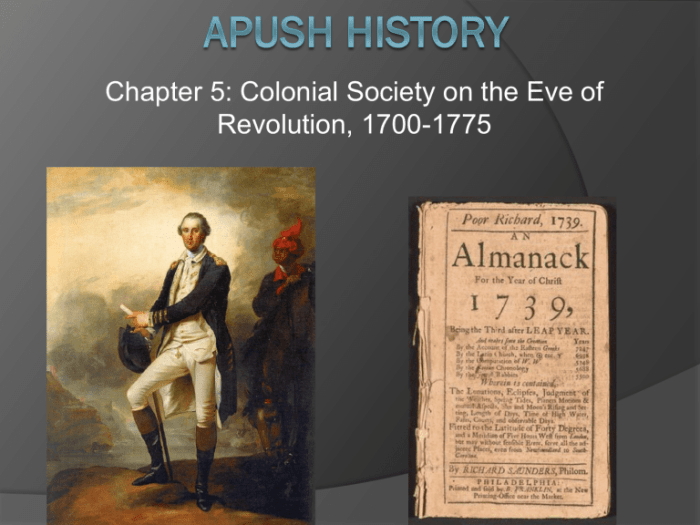Chapter 5 colonial society on the eve of revolution – Chapter 5: Colonial Society on the Eve of Revolution delves into the multifaceted characteristics of colonial society during the years leading up to the American Revolution. This chapter examines the distinct social classes and their complex relationships, highlighting the tensions and conflicts that permeated colonial society.
By exploring the interplay of economic, political, social, and cultural factors, this chapter provides a comprehensive understanding of the forces that shaped the revolutionary spirit among the colonists.
Colonial Society on the Eve of Revolution: Chapter 5 Colonial Society On The Eve Of Revolution

In the decades leading up to the American Revolution, colonial society underwent significant transformations. A growing population, a diversifying economy, and increasing political tensions all contributed to a sense of unrest and a desire for change among the colonists.
Colonial society was divided into a number of distinct social classes. At the top of the social hierarchy were the wealthy landowners and merchants. These elites controlled much of the colony’s wealth and power. Below them were the middling classes, which included farmers, artisans, and shopkeepers.
The majority of colonists were poor farmers and laborers.
Tensions between the different social classes were a major source of conflict in colonial society. The wealthy elites often looked down upon the lower classes, and they were reluctant to share their power. The lower classes, in turn, resented the elites’ wealth and privilege.
Economic Factors
The colonial economy was based on mercantilism, a system in which the colonies were expected to provide raw materials to the mother country and to purchase finished goods from the mother country. This system benefited the British economy, but it often worked to the detriment of the colonial economy.
In the South, the plantation economy was the dominant economic system. Plantations were large farms that produced cash crops such as tobacco and cotton. Plantations were worked by enslaved Africans, who were treated as property.
Economic factors played a major role in the tensions between colonists and Great Britain. Colonists resented the British government’s attempts to regulate their trade and to impose taxes on them.
Political Factors, Chapter 5 colonial society on the eve of revolution
The colonial government was a complex system of checks and balances. The British government appointed the governors of the colonies, but the colonies also had their own elected assemblies. The assemblies had the power to pass laws and to levy taxes.
Over time, the colonists grew increasingly dissatisfied with British rule. They resented the British government’s attempts to control their economy and to limit their political rights.
The following are some of the specific events that led to the outbreak of the American Revolution:
- The Stamp Act of 1765, which imposed a tax on all printed materials.
- The Townshend Acts of 1767, which imposed taxes on a variety of goods imported into the colonies.
- The Boston Tea Party of 1773, in which colonists dumped a shipment of tea into Boston Harbor to protest the Tea Act.
- The Intolerable Acts of 1774, which punished the colonists for the Boston Tea Party.
FAQ Corner
What were the major characteristics of colonial society on the eve of the American Revolution?
Colonial society was characterized by a rigid social hierarchy, economic disparities, and political grievances. Social classes ranged from wealthy landowners and merchants to indentured servants and slaves. Economic factors, such as mercantilism and the plantation economy, contributed to tensions between colonists and Great Britain.
How did economic factors contribute to tensions between colonists and Great Britain?
Mercantilism, a British economic policy that restricted colonial trade, limited the economic opportunities of colonists. The development of the plantation economy in the South, which relied on slave labor, created a deep divide between the Northern and Southern colonies.
What were the key political factors that led to the American Revolution?
Growing dissatisfaction with British rule, fueled by factors such as taxation without representation and the Stamp Act, played a significant role in the outbreak of the American Revolution. The colonists resented the British government’s attempts to exert greater control over the colonies.

